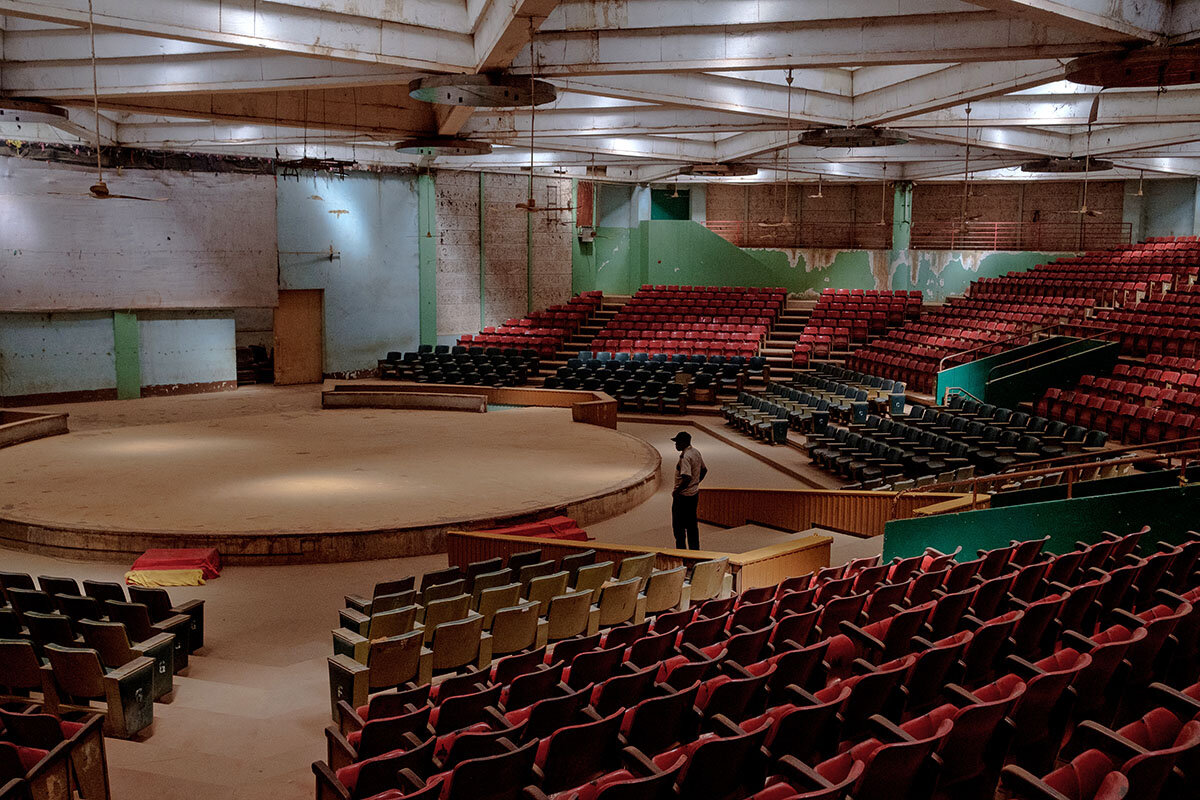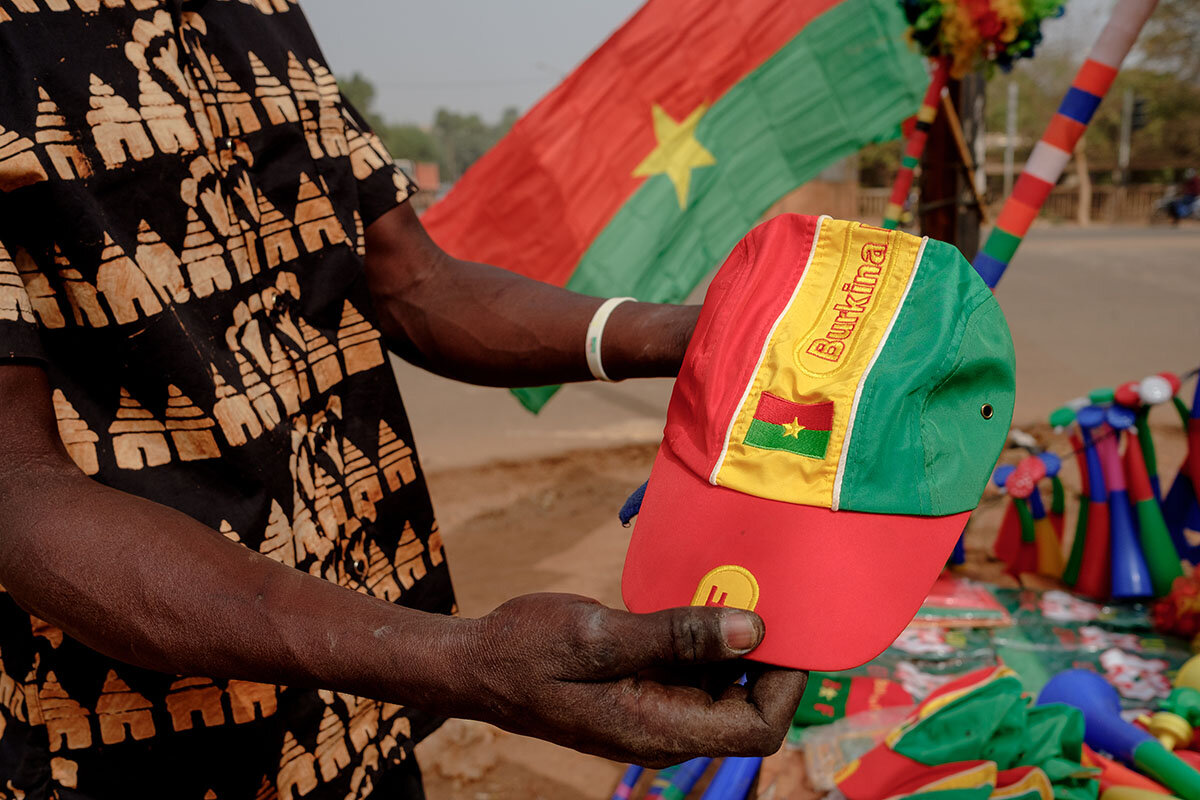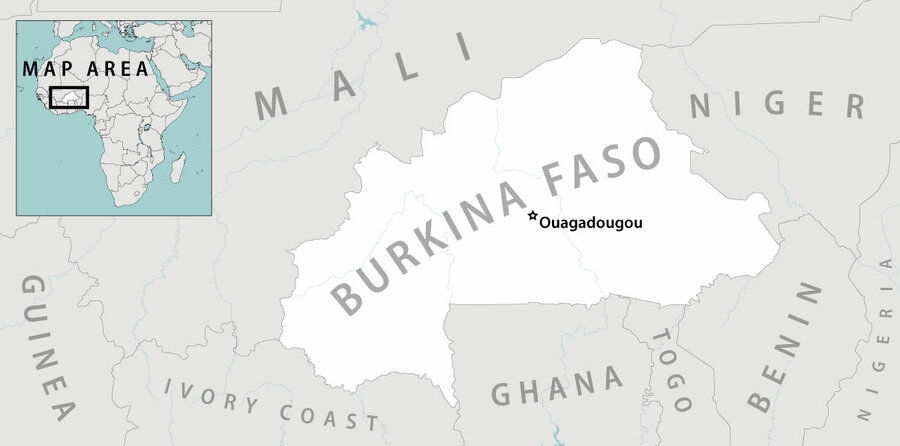Burkina Faso coup: How democracy crumbled under jihadi stress
Loading...
| Ouagadougou, Burkina Faso
The day after volleys of gunshots ringing through the streets of the capital last Monday signaled the ousting of Burkina Faso’s democratically elected president, 21-year-old Ibrahim joined thousands cheering in the streets.
“With the former regime, there was no peace, but now our hope lies with the putschists,” the high school student said, as he raised a fist and posed beside an image of a soldier on a mural in the Place de la Nation in central Ouagadougou.
His enthusiasm for the military coup reflects broader discontent in West African countries with civilian leaders who have proved unable to curb swelling Islamist violence, and who respond to criticism and protests by shutting down the internet and using tear gas.
Why We Wrote This
This week’s military coup in Burkina Faso revealed how jihadi violence is undermining democracy in West Africa. How easily can it be restored?
“There is a profound disillusionment with the democratic system, and to some extent people see a ray of hope in the military,” says Fahiraman Rodrigue Koné, a researcher at the Institute for Security Studies, a regional think tank.
“People believe that democratically elected elites have failed to meet their basic needs,” he adds, especially the need for protection against increasingly violent raids by Islamist groups who have taken over wide swaths of northern Burkina Faso.
And with Africa’s vast population of young people riding a social media wave of Pan-Africanist and anti-European sentiment, some analysts believe that Burkina Faso’s will not be the last civilian government in the region to fall.
“Safeguard and restoration”
It is only a little over seven years since a popular uprising overthrew the country’s last military ruler, Blaise Compaoré, and young men like Ibrahim cheered the army’s departure.
But Roch Marc Christian Kaboré, the man elected president in 2015 and again in 2020, has been unable to stem jihadi violence. Last Monday, a group of soldiers calling themselves the Patriotic Movement for Safeguard and Restoration announced in a televised broadcast that they had suspended the constitution.
They said they were taking over in part because of the civilian government’s inability to rein in an Islamist insurgency that has engulfed much of the once-stable nation of 21 million.
Africa’s generation of strongmen, seizing power in coups, is largely a thing of the past. But many fear that a new age of military rule or extensions of constitutional term limits could be dawning. Mr. Kaboré’s overthrow marks the third time that the military has seized power in a West African nation in the last eight months.
In neighboring Chad, the president’s death last year led to his army officer son taking over; to the south, in Guinea, Alpha Condé was ousted by a member of an elite special forces unit after attempting to change presidential term limits. The playbook is still open as far afield as Sudan, in East Africa, where military men have also taken control in recent years.
Lt. Col. Paul-Henri Damiba, the Burkinabé coup leader, appears to have been emboldened particularly by the young, Western-trained elite military men who seized power in Mali last year. There too, the coup was preceded by spiraling jihadi violence and a violent crackdown on protesters.
Jihadis have been exploiting local grievances and discontent with regional governments for over a decade, attacking already limited state institutions throughout broad swaths of the Sahel, a vast band of semiarid scrubland south of the Sahara desert.
For years, Burkina Faso largely escaped the violence that had roiled its neighbors. Mr. Compaoré, the former military ruler, reportedly enjoyed close links with some of the insurgent groups, Islamist or otherwise. That enabled him to keep them out of his backyard and often cast him in the role of mediator in the region’s multiple conflicts.
With Mr. Compaoré gone, jihadis who had been gradually gaining ground across the poor, unstable region since the end of the 1990s – despite many attempts by French and allied regional forces to expunge them – soon found fertile new ground in Burkina Faso. Since Mr. Kaboré took office in 2015, Islamist violence has displaced 1.5 million people, killed thousands, and sent civil servants, teachers, health workers, and other government employees fleeing in what was already one of the world’s poorest nations.
In November, an attack on a military base in the northern town of Inata that killed 49 soldiers and four civilians caused national outrage when it was revealed that the soldiers had run out of food. Protests broke out, demanding a stronger response to the security crisis, but the government cracked down on them.
Ibrahim, the high school student who asked that his family name not be used for his own safety, is no stranger to the turmoil. Three years ago, he helped his family evacuate their hometown of Tasmakatt, in the northern Sahel region, after men in turbans stormed the local mosque and ordered residents to leave the town within 72 hours. His herder family lost all their cattle and now live in Gorom Gorom, an area where violent attacks on civilians and security forces are also a regular occurrence.
“All we want is peace,” says Issa, a friend of Ibrahim’s whose family also comes from Tasmakatt and evacuated to Gorom Gorom.
A fraught path back to democracy
But the path to stable democracy in the Sahel remains fraught.
On the one hand, jihadi violence is stretching the region’s fragile and flawed democracies to breaking point. “Jihadist groups have exploited the limits of governments in West African countries, particularly when it comes to lack of access to justice and basic social goods,” says Mr. Koné, the political analyst.
Ironically, Western support for regional governments fighting Islamist insurgents may have highlighted those limits by undermining official accountability in West Africa’s fledgling democracies, says Anna Schmauder, a researcher with the Clingendael Institute in the Netherlands.
“Collaboration in the realm of counterterrorism … has been the prime focus and has effectively prevented accountability in the realm of human rights or anti-corruption and transparency,” she says.
On the other hand, military rulers have proved unwilling to hand back power easily. In Mali, the army recently announced a timetable that would postpone a return to civilian rule for four more years. The fear, says Corinne Dufka, West Africa director for Human Rights Watch, is that this will become “the template.”
Meanwhile, regional organizations have been unable to preserve democracy. The Economic Community of West African States (ECOWAS) suspended Burkina Faso on Friday; earlier this month it imposed economic sanctions on Mali, and promised more unless the government held elections next month.
But such actions come too late, Mr. Koné complains about ECOWAS. “They are not proactive and don’t take enough initiative to prevent these situations from happening,” he says. “They only intervene at the worst moment, like firemen.”
While many Burkinabés have cheered on the coup leaders, analysts say that their backing comes with conditions, and that many citizens might not support protracted military rule.
“The insurrection of 2014 [that unseated Mr. Compaoré] was clearly a demand from the population. They didn’t want to see the military ruling the country because they suffered for a long time,” says Paul Koalaga of the Institute for Strategy and International Relations in Ouagadougou.
Civil society groups appeared divided this week over how to react to the coup.
Coup leader Colonel Damiba pledged on Thursday that he would restore constitutional order to Burkina Faso “when the conditions are right, according to the deadline that our people will define in all sovereignty.”
For now, citizens like Issa and Ibrahim are waiting to see what unfolds.
“For the moment we are not able to say anything because they just came to power,” says Issa. “We will be observing.”









